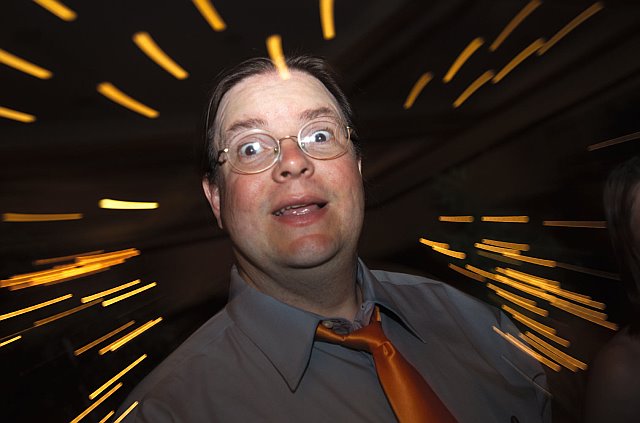Chronicle West
Before we get back to my top 10 list, I want to take a moment to direct your attention to a great new blog from a former colleague and drinking buddy of mine. Brandon is not only one of the funniest storytellers I know, he's also a guy who has conquered the realm of academia without becoming a complete twit. Brandon, to me, is everything you could ask for in an educated man who enjoys getting his swerve on (I don't actually know what that means). And he writes like a fiend; he's some perverse mix of Chuck Klosterman, Edward Abbey, and Hunter S. Thompson. It's a wonder more people don't hate him.
Anyway, he has a blog up that's full of hell and damnation against the purveyors of environmental degradation and political stupidity (redundant?) in the Western United States, but also takes the time for reading recommendations and top 11 lists.
As a sort of preface to surfing on over to Brandon's site, I offer this quote from David Foster Wallace. Wallace is a guy whose fiction seems mainly geared toward fans of postmodernist experimentation and is, therefore, completely unreadable. However, my brother recently loaned me [heh] his copy of Wallace's A Supposedly Fun Thing I'll Never Do Again, which contains an essay entitled, "E Unibus Pluram: Television and U.S. Fiction." This is an incredibly prescient essay written in 1993 regarding the effects of the boob tube on fiction writers and readers. (I looked for a copy online, but all the copies I could find were on library databases. You should look it up and read it in its entirety.) I'm going to quote the last paragraph out of context because it reminds me of Brandon's writing:
The next real literary "rebels" in this country might well emerge as some weird bunch of anti-rebels, born oglers who dare somehow to back away from ironic watching, who have the childish gall actually to endorse and instantiate single-entendre principles. Who treat of plain old untrendy human troubles and emotions in U.S. life with reverence and conviction. Who eschew self-consciousness and hip fatigue. These anti-rebels would be outdated, of course, before they even started. Dead on the page. Too sincere. Clearly repressed. Backward, quaint, naive, anachronistic. Maybe that'll be the point. Maybe that's why they'll be the next real rebels. Real rebels, as far as I can see, risk disapproval. The old postmodern insurgents risked the gasp and squeal: shock, disgust, outrage, censorship, accusations of socialism, anarchism, nihilism. Today's risks are different. The new rebels might be artists willing to risk the yawn, the rolled eyes, the cool smile, the nudged ribs, the parody of gifted ironists, the "Oh how banal." To risk accusations of sentimentality, melodrama. Of overcredulity. Of softness. Of willingness to be suckered by a world of lurkers and starers who fear gaze and ridicule above imprisonment without law. Who knows?
Ladies and gentlemen, go read Chronicle West.
Anyway, he has a blog up that's full of hell and damnation against the purveyors of environmental degradation and political stupidity (redundant?) in the Western United States, but also takes the time for reading recommendations and top 11 lists.
As a sort of preface to surfing on over to Brandon's site, I offer this quote from David Foster Wallace. Wallace is a guy whose fiction seems mainly geared toward fans of postmodernist experimentation and is, therefore, completely unreadable. However, my brother recently loaned me [heh] his copy of Wallace's A Supposedly Fun Thing I'll Never Do Again, which contains an essay entitled, "E Unibus Pluram: Television and U.S. Fiction." This is an incredibly prescient essay written in 1993 regarding the effects of the boob tube on fiction writers and readers. (I looked for a copy online, but all the copies I could find were on library databases. You should look it up and read it in its entirety.) I'm going to quote the last paragraph out of context because it reminds me of Brandon's writing:
The next real literary "rebels" in this country might well emerge as some weird bunch of anti-rebels, born oglers who dare somehow to back away from ironic watching, who have the childish gall actually to endorse and instantiate single-entendre principles. Who treat of plain old untrendy human troubles and emotions in U.S. life with reverence and conviction. Who eschew self-consciousness and hip fatigue. These anti-rebels would be outdated, of course, before they even started. Dead on the page. Too sincere. Clearly repressed. Backward, quaint, naive, anachronistic. Maybe that'll be the point. Maybe that's why they'll be the next real rebels. Real rebels, as far as I can see, risk disapproval. The old postmodern insurgents risked the gasp and squeal: shock, disgust, outrage, censorship, accusations of socialism, anarchism, nihilism. Today's risks are different. The new rebels might be artists willing to risk the yawn, the rolled eyes, the cool smile, the nudged ribs, the parody of gifted ironists, the "Oh how banal." To risk accusations of sentimentality, melodrama. Of overcredulity. Of softness. Of willingness to be suckered by a world of lurkers and starers who fear gaze and ridicule above imprisonment without law. Who knows?
Ladies and gentlemen, go read Chronicle West.


0 Comments:
Post a Comment
<< Home